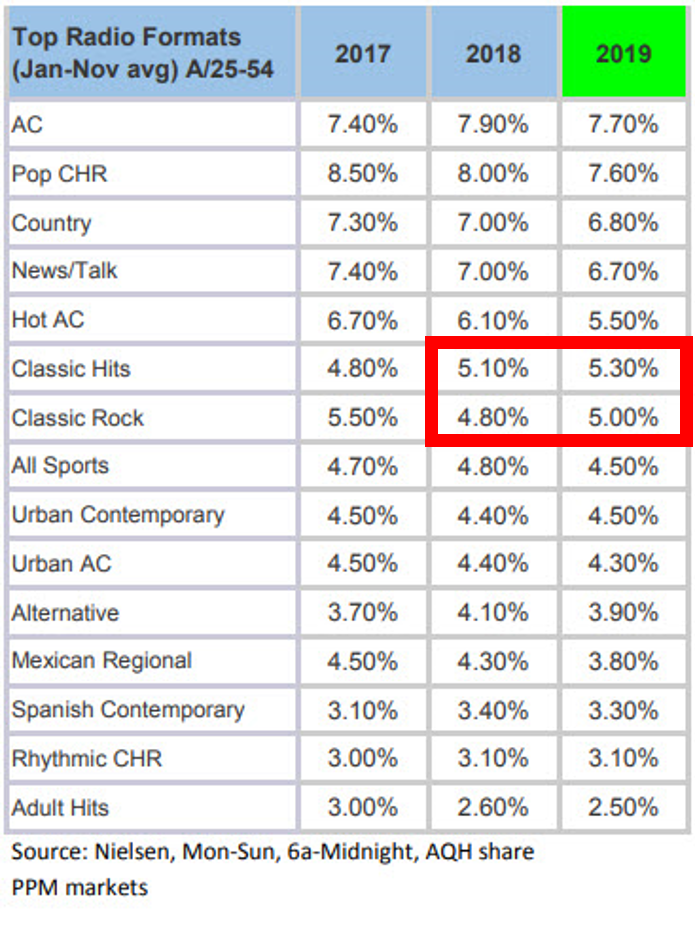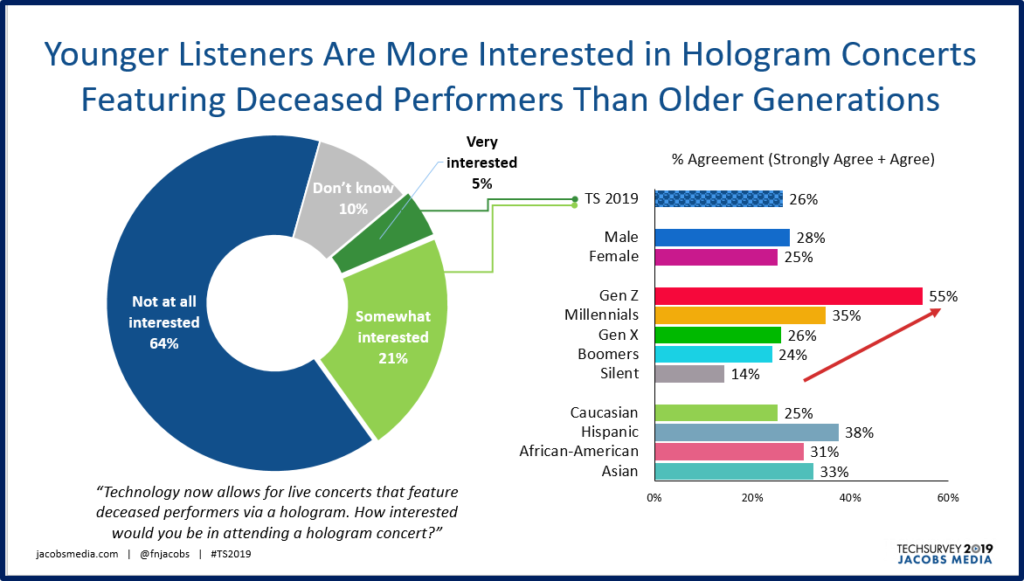Is The Clocking Ticking For Classic Rock?
Despite relying on artists who rose to fame decades ago, classic rock has remained a powerful force in the music business, using technology and fresh faces to repeatedly reinvent itself.
___________________________________
Guest post by Fred Jacobs of Jacobs Media
A regular topic in this blog is Classic Rock – the music, the format, and the culture.
And why not? Classic Rock has been a driving force in our company since we put the format on the map in the mid-80’s. Back then, the conventional wisdom was “It will never last.”
It wasn’t just radio people doing the naysaying. It was the entire record label community, lamenting the format’s initial burst of popularity and buzz. Back then, catalogue sales was, at best, a cottage industry. Their entire focus was on breaking new music. And as Classic Rock grew and proliferated, an unintended consequence was less new rock on the radio airwaves.
Well, here we are 35 years later, and the format is going strong. Earlier in the week, Inside Radio and other trades printed format trends for 2019 from the Nielsen data bank. While nearly every format has been heading south, Classic Rock and Classic Hits have generally been headed in the opposite direction. And both are finishing the year in a strong position in many of the nation’s largest and most competitive markets in the demographic – 25-54 Adults – radio cares most about:

Not bad, right?
There’s a lot of money being made in the Classic Rock ecosphere. Just in time for Christmas, Hanukkah, Kwanzaa, and Festivus (did I miss anyone?), Sony has cut what appears to be an amazing deal on Beatles merch.
A publication that knows a little something about finance – the Wall Street Journal – reported last week about a breakthrough merch deal between Sony Music Entertainment and a 1960’s band you may have heard of.
The Beatles.
Neither side disclosed the deal details, but Sony has already set up a pop-up store in New York City to capitalize on what WSJ writer Anne Steele refers to as a “rising interest in music merchandise.”
We saw that in this year’s Techsurvey – a point that should not be lost on some of the better radio station brands out there.
And then there’s this pronouncement from no less than Rolling Stone:
“The clock may be ticking on classic rock, but as bands evolve into brands, they’re finding endless renewability.”
That’s another way of saying the genre isn’t just sustainable, it has evolved. Not bad for a format where rock star deaths have become more and more prevalent.
Of course, that trend will continue, but as writer Kory Grow points out, there are several factors contributing to the format’s resilience and continued success:
1. Replacements – Not every Classic Rock band can pull this off, but Adam Lambert filling in for Freddie Mercury has been beyond well-received. As Brian May pointed out, “Being in Queen now feels like the old times because it has become as big as the old times.”
Queen is not a one-off. While Don Henley was sure the Eagles were finished after Glenn Frey passed away four years ago next month, Vince Gill and Frey’s oldest son, Deacon, have filled in admirably.
2. Biopics and docs – Of course, there’s “Bohemian Rhapsody,” the film at the cornerstone of Queen’s comeback. But “Rocketman” – while not as mass appeal – introduced new fans to Elton John, while fueling the box office for his final tour. Motley Crue’s doc on Netflix – “The Dirt” – exposed the band to scads of consumers who saw the band in a whole new way. As the years roll on, the list will go on and on because these efforts tend to be popular – and profitable.
3. Residencies – These are getting bigger and bigger – a way for aging Classic Rockers to stay fresh on concert tours – becasue they don’t move. Las Vegas is the key destination, and residencies have included Aerosmith and Guns N’ Roses. But then there was Bruce Springsteen’s amazing Broadway run – 14 months- a different kind of residency and stage show that gave even his most ardent fans a way to see him in an entirely different format. And yes, it also became a Netflix special.
4. Holograms – We’ve blogged about this before, including tours for Ronnie James Dio, Frank Zappa, and Roy Orbison. And we even asked about their viability in our last Techsurvey.

More than one in four respondents expressed interest in hologram tours. And as you can see in the demographic groups, enthusiasm grows among the younger end of the generational spectrum – a great sign for a format where radio programmers are always concerned about the so-called “demographic cliff.’
The late Frank Zappa’s son, Ahmet, is now in control of his famous father’s brand. He’s been the most vocal supporter of these virtual concerts: “I do hope they become more of the norm.”
5. Technology – The confluence of multi-media and digital technology has provided numerous branding tools for Classic Rockers – books, films, music, merch (including online stores), social media, streaming, podcasts, festivals, subscription fan clubs. All these assets gives artists -and their estates – more room to carve out their own unique strategy, while connecting with their loyal fan bases.
Kristin Mulderig is with the management team working with Slayer’s next incarnation, and she calls it “legacy mode” – a fascinating place where more and more Classic Rockers are ending up.
6. The music – Rolling Stone dances around this important point, but none of this works without an incredible portfolio of music. Every band we’re talking about has a resume unmatched by many of the performers that came later – concerts, albums, and other work that has truly stood the test of time – on the radio and off. The fact we gladly watch Adam Lambert, Rami Malek, and Taron Egerton on stage and in films play the roles of our heroes isn’t much different than watching the Detroit Symphony Orchestra led by conductor Leonard Slatkin perform works that are well more than a century old. The music is outliving those who originally wrote and recorded it.
Kory Grow points out, “The whole idea of ‘what’s next?’ has rejuvenated classic rock from top to bottom.”
But perhaps the most telling quote in the Rolling Stone story is from Bruce Resnikoff, president and CEO of UMe:
“Everybody needs to think this way. Every band will approach it in a different way, but every legacy band has an opportunity to think much differently than they ever did and to work with their music and tell their story — movies are one way to tell a story, books, documentaries, and video streaming are other ways — to a much wider audience and in much bigger ways than they ever could. Everybody, in every aspect of this business, has to think differently than they once did.”
Including those who own, manage, program, and market Classic Rock radio stations.
Fred Jacobs: President & Founder at Jacobs MediaFred Jacobs founded Jacobs Media in 1983, and quickly became known for the creation of the Classic Rock radio format.
Jacobs Media has consistently walked the walk in the digital space, providing insights and guidance through its well-read national Techsurveys.
In 2008, jacapps was launched – a mobile apps company that has designed and built more than 1,200 apps for both the Apple and Android platforms. In 2013, the DASH Conference was created – a mashup of radio and automotive, designed to foster better understanding of the “connected car” and its impact.
Along with providing the creative and intellectual direction for the company, Fred consults many of Jacobs Media’s commercial and public radio clients, in addition to media brands looking to thrive in the rapidly changing tech environment.
Fred was inducted into the National Radio Hall of Fame in 2018.
Queen and Adam Lambert, the supernally talented Adam Lambert- were selling out arenas long before BoRhap was released. Now the demand is even greater. There’s a reason Dr May and Mr Taylor call Lambert “the GFG”, the gift from God